BAND of DRUMMERS The Teaching Legacy of Kenny Aronoff
|
Note: During NAMM 2012 the Band of Drummers had a reunion of sorts with Clark Becker, Mike Dupke, Ryan Brown, Kenny Aronoff and myself making it to NAMM. Three others (Pete Wilhoit, Tommy Diehl and Kevin Leahy) celebrated David Baker's 80th birthday in Bloomington, IN. Below they fly home to make more music on the East Coast. Ever since DRUMline celebrated our Launch Party in the RAP Room at the Hard Rock Cafe, West Coast and East Coast factions are developing. I hope cooler heads will prevail and this doesn't get ugly!
|
 |
| Pete Wilhoit, Tommy Diehl and Kevin Leahy on a Non-Fiction Plane |
|
|
Photo Album Gallery Place Holder - Please wait while the Photo Album loads.
If the album does not show, please refresh the page to try again.
|
Classical Greek philosopher Socrates (469-399 BC) taught Plato who took Aristotle as a student. Plato’s Republic contrasted perception and reality. Although an original work, you can trace the free thinking inspiration back to Socrates. We all have influences, some greater than others; rarely those who truly inspire us… affecting our daily lives. This is a story of percussive spirit weaving its way through decades of music, diverse in style yet linked by integrity. Kenny Aronoff’s drumming career has been well documented. Yet only through the unique filter of his vast experience could the lessons of the world’s finest timpanists influence so many current drum set artists impacting music today. ‘He is a man of courage that does not run away, but remains at his post and fights’ Socrates
Kenny Aronoff: When I started playing the drums at age 10, I didn’t have a drum set teacher as a role model. I was self taught except for learning snare drum technique and how to read music. At age 16 – 23, however, I studied percussion and timpani with Arthur Press and Vic Firth from the Boston Symphony Orchestra and eventually 4 years with George Gaber at Indiana University- IU. These role models all studied at Julliard with Saul Goodman of the New York Philharmonic, probably the most famous timpanist up until Vic Firth. Claude Duff, also a student of Goodman, wound up having a beautiful soft sound with the Cleveland Symphony Orchestra; whereas The Boston Symphony Orchestra was a much more aggressive orchestra, suited for Vic Firth with perfect time, immaculate precision and rhythm. George Gaber was more in the middle…soft with some aggression. These guys were the best of the best! When you had a lesson with Vic Firth, if you made a mistake, fine… he would let you try again, but if you make that mistake again, he would simply move on to the next exercise, because you were obviously not prepared. If you were done with your lesson in 15 minutes, that was it.....he had no time to waste. Arthur Press grew up in a family in NYC where studying music was not their first priority... surviving and making a living was the main focus in life. When he told his parents he was going to music school, they were shocked... ‘Are you kidding…you need to get a real job and make a living.’ So music school was not this leisurely thing…it was hardcore. ‘I’m fighting for my life, I can’t fail…if I fail, I fail for my family.’ He was all about discipline and perfection just like Vic Firth. They were only interested in very dedicated and serious students.
|
 |
| Kenny on Timpani at IU in the 70's |
|
|
In my first lesson with Arthur Press, he said ‘What have you prepared for me today’, I’m like ‘Huh?’ ‘Well have you prepared a mallet piece?’ I’m like 16 years old, never played a marimba or a vibe in my life. I came from a small town, played sports and had a rock band with my brother. When I went to Arthur Press, I didn’t know anything about timpani and mallets. ‘Well, have you prepared a timpani piece for me?’ I said ‘I don’t play timpani’… He looked down on me ‘What are you doing here…what do you play?’ I said ‘I play drum set’. He asked me to play and within two minutes he yanked me off the drum stool and said ‘You need to start with the basics’, so we went right to a practice pad. He had me in tears many times…why I stayed with him I don’t know. Those moments in life are crossroads. Even though I didn’t practice enough for him, something about his intensity and knowledge made me want to work hard for him. Moving forward, all the training at UMass (one year with Peter Tanner) and 4 years at IU studying technique taught me discipline and how to play all the percussion instruments in many different musical situations. My focus was on practicing as much as possible: lessons, performing in small percussion or jazz band ensembles, large ensembles which were symphony orchestras for me. At IU, I had to perform in an opera twice a year. Music history, literature, theory, conducting, piano, sight singing and sight reading were all part of my education along with regular academic courses like Science, Literature and Math. All this made it possible for me to develop my skills. I was practicing as much as possible when I wasn’t in a rehearsal, performing or studying. All of this came down to extreme discipline. I already had it in me but I got excited about working my ass off. It wasn’t easy man! Vic Firth, Arthur Press and George Gaber demanded intense discipline and relentless perfection from me. It was a privilege to study with these men for many reasons…mostly, I realize now it took my life to another level.
|
‘Where there is reverence there is fear’ Socrates KA: Gaber, Firth and Press were the heavyweights of timpani and classical percussion. Gaber worked with Stravinsky. He was basically Stravinsky’s drummer you might say. All these guys had those influences. I was fortunate to perform timpani with the great composer and conductor Leonard Bernstein when I spent a summer in the student orchestra under the guidance of the Boston Symphony Orchestra called Tanglewood. This is still where the Boston Symphony Orchestra performs every summer. When I went to Tanglewood we got conducted by everyone who conducted the Boston Symphony Orchestra. They only took seven percussionists in the entire world. It took me four years, and four auditions to get accepted to Tanglewood. It was like ‘I’m sorry Mr. Aronoff we’re not accepting you,’ but I kept coming back every year! After all this classical training and two opportunities to join orchestras, one in Quito Equador and the other in Israel, I decided my heart was more into playing the drums. It was an intense realization that I would rather play in a club for $50 a night than wear a tuxedo and perform with a symphony orchestra. Immediately after graduating from IU, I started studying drums with Alan Dawson in the Boston area and Gary Chester in the NYC area. I began an 8 hour daily practice routine for a year, while performing as much as possible. I eventually formed a band (STREAMWINNER) and moved back to Bloomington where I lived in a band house. We performed all over the Midwest. After three years I quit the band. Two weeks before I was going to move back to NYC, I auditioned for the John Cougar Mellencamp band. He liked my playing and I ended up making hit records and touring the world in his band for 17 years. I continued to practice and learn as much as possible. I took all my classical training plus what I learned on drum set and eventually created the Power Workouts (hand and foot exercises utilizing George Lawrence Stone’s 13 basic sticking patterns from Stick Control). Those exercises were designed to warm me up completely in 15 minutes focusing on four way coordination, perfect time with a metronome, right and left hand leads and mental focus. I also taught my students this technique that they could apply to all types of drumming. It wasn’t just the exercises, it was the discipline that’s real important at that time in your life. In order to get through the Power Workout the goal was to do it at any tempo but you had to play the whole thing top to bottom with no mistakes or do it again. MS: That came right out of your training. KA: It came right out of my marimba lessons with George Gaber and Arthur Press and tympani lessons with Vic Firth.. I used to walk into a lesson and before I pulled my mallets, assignment book and music out of my bag, George Gaber would say ‘F# Harmonic Minor, two octaves start with your right hand, 3, 4…!’ without even looking at me. If I was standing there with my mallets and not playing he’d say ‘Are you happy here Mr. Aronoff? Do you like it here at Indiana University? You don’t seem like you’re really into it.’ When his students would walk into his office the marimba exercises he used from the Phil Kraus mallet book were the fear of death for everybody! After many intense lessons with George Gaber, I saw people leave his office and quit music never to be seen again…he demanded 150%
|
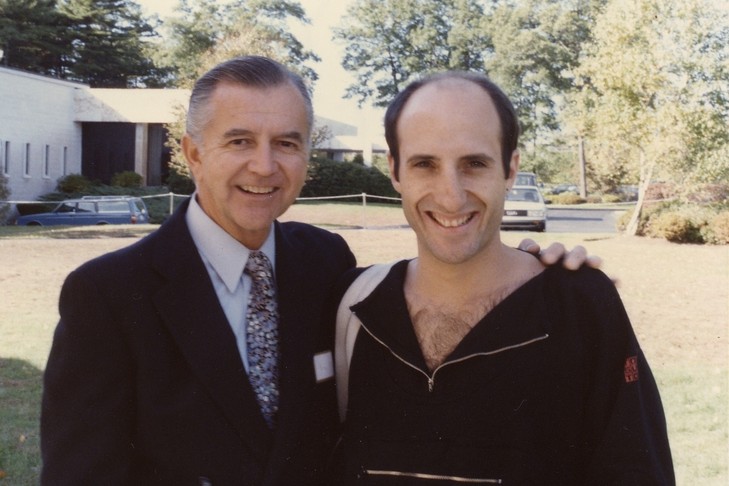 |
| Vic Firth and Kenny |
|
|
If nothing else, forget the exercises, George Gaber taught me how to be prepared, how to deal with my own personal fears, insecurities and self value. He challenged all of that.. it was an introduction to survival... I think everybody eventually has an experience like George Gaber’s lessons. If you avoid that kind of experience you’re gonna avoid a lot of self development in life. These kinds of experiences change people forever…it did for me. Embracing the fear, figuring a way to get thru that even with the fear…that becomes an exercise in itself. You’ve now experienced what it’s like to be afraid of something and come out victorious. Fear shouldn’t stop you, it’s a challenge. The lesson is…’I know I’m afraid but I’ve been here before and have won… so here I am again…I got thru this before, I can get thru it again.’ That’s a big lesson! I remember telling one of my students at IU, Kevin Leahy, ‘Alright, c’mon dude, when you graduate in 2 weeks you know you’re competing with me. That day we are fighting for the same job. If I’m willing to work 18 hours a day, 7 days a week every year, that’s what you’re competing with.' Just to get him pumped I told him I would do 2 or 3 push ups to his one. I made him get down and do push ups. ‘You gotta be strong, you gotta be powerful, you gotta have fire, man. You gotta go out there and attack!’ I was training and lifting weights so I could smoke all of ‘em! (laughs) Maybe that’s why my students are becoming successful because they can say, ‘Kenny did it, not only that… he’s still doing it. He’s still pushing on; he’s still on TV five times a year. How does he do it? He’s 500 years old!’ (laughs) It’s not like ‘Kenny what are you doing now?’ ‘Aw, I’m retired, I’m in Hawaii’, no not at all, I’m living in LA and I’m driving. I’m still trying to squeeze everything in!
|
‘Let him that would move the world first move himself’ Socrates MS: You were still doing sessions while teaching at IU (’93-’96). KA: That was the philosophy at IU. IU was and still is one of the top 3 Music Schools in the country along with Julliard and the Eastmon School of Music. Bloomington, Indiana is so removed (geographically) from a big city, in order to get great teachers they allowed them to go out and perform. I brought that up at the meeting when they wanted me on the staff. I had to be flexible to be gone for a week or two on tour, recording sessions or TV appearances. MS: You have a lot of successful students. What did you teach them that prepared them for the future? KA: The degree programs at IU were based on Classical and Jazz studies. I did teach my students Jazz, but I was also teaching them what I was going through… a part of the music business that was happening RIGHT THEN AND THERE! It wasn’t like ‘Oh back in the day when I was happening’… I was part of what was happening right then. I remember flying on a private jet after playing in Montreal for 18,000 people with John Cougar Mellencamp, landing in Bloomington and going to Leahy’s house for a big party and drinking with the guys, same night – that’s CRAZY!
|
They studied with me at a time when what I was doing was current events, we were defining a style of music or redefining it. We were popular and they could be a part of it. I remember telling them ‘I’m not going to be here this week; I’m doing the Letterman show subbing for Anton (Fig).’ MS: David Woods, IU Music School Dean (late 90s), told me when you got the Smashing Pumpkins gig, you were the fittest guy they could possibly get. KA: They needed somebody to beat the crap out of that band. I was hired to keep it together and I was like a freight train!
MS: Your playing is very physical yet you never seem to lose the groove. KA: That’s a tough challenge, to play hard and make it groove. It’s really hard to play hard and not lose your groove. You can have an effect on a band without being aggressive and powerful like me. I’m so passionate I will bring a fire and when the music starts it’s hard to stop me. (laughs) When I recorded ‘Paper in Fire’ for John Mellencamp in 1986 on his Grammy winning ‘Scarecrow’ record he told me not to do all that cross stick stuff at the beginning. However, when the red light came on when we started recording I did it anyway. I really felt that part drove the song immediately.. I was passionate about it...but…you shouldn’t always do that, you can get fired. (laughs) MS: I think that was a defining moment in drumming. It’s the perfect beat for that song. You’ve never heard it before or since. KA: It defines that song especially with the violin and the accordion. It’s subtle because it’s not in your face, yet it’s powerful. I don’t think I’m subtle usually; but at that moment I was subtle and powerful. (laughs)
MS: It happened one time! (laughs)
|
KA: There was a cool article about me in the Sunday New York Times in the early 90's; amazing because it was a huge honor to be in the Arts and Leisure section as a session drummer. In that article, Don Was, the producer, said some amazing things. I just thought about it because I ran into him yesterday at a studio where I am recording. That studio is where I did Iggy Pop’s Brick by Brick record with Don Was as producer. While we were recording Don left for the Grammys. He won 5 Grammys that night which changed both our lives. He reminded me I saved that session one day. He said at one point Iggy was kind of down, which I don’t remember, and that affected everyone else’s mood, but my positive and intense energy turned the whole session around. Don said I lifted everyone up with my high positive energy and changed the entire vibe of the room by kicking everyone’s ass playing with passion, power and excitement! My point is.... that is not something I learned, it’s just the way I was made.
|
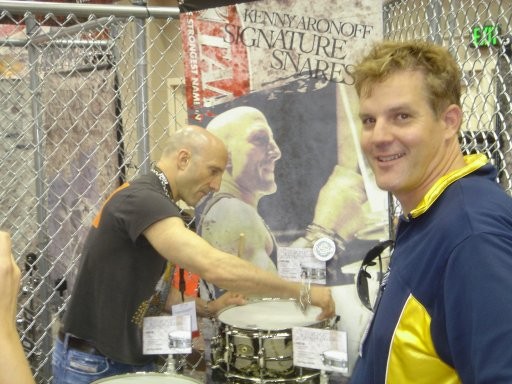 |
| Kenny tuning his signature Trackmaster snare and me, Summer NAMM - Indy 2005 |
|
|
‘Employ your time in improving yourself with other men’s writings, so you shall gain easily what others have labored hard for’ Socrates KA: Gaber, Firth and Press were huge role models for me but I didn’t originally study drum set. How did I get where I am? I eventually studied with Alan Dawson, one of the finest traditional jazz players in Boston and Gary Chester, famous for the New Breed book, in New York. MS: IU was strictly a traditional jazz department before you taught there. You were an innovator in drum set. KA: I met with the head of the department George Carlyss and the other main percussion teachers. We agreed this would be wonderful to make the school well rounded. They said, ‘Why don’t we have Kenny teach drum set? You can come and go as you please because we know you’re in a very famous band at a busy time in your career, also playing with a lot of famous musicians.’ So there was no problem in the department, problem is outside the department they weren’t there at the meeting. I heard David Baker, whom I’m friends with, was a little frustrated because he thought I would be teaching more jazz when I was hired. I was never told that… I was told to teach whatever I felt was appropriate for these kids given that I graduated from IU with the highest honors you can get from the music department. I was a perfect candidate to understand the program and to understand the real world because I was in the real world doing sessions, TV, tours around the world… you name it…I was doing it, so I was the perfect guy to come in there and prepare kids for the real world and understand the system of the school. I did teach jazz, but in addition to that I was teaching them how to survive and make a living when they left IU. I believe that it is a very important part of a student’s education. In order to get my students to understand how to play the drums in a band with feel, I had them learn Back in Black by AC/DC which most people think is an easy drum beat No one played it properly. My students could hit the notes but they didn’t understand the feel… AT ALL! I knew why they didn’t understand it ‘cause I didn’t understand it for a long time either. When I was in music school I was so caught up in technique that I missed the most important thing… being a musician and understanding what’s right for the job you’re on. You can’t bring your timpani mallets to a rock audition. You can’t play as if you’re in a soft jazz trio when you’re playing heavy metal. They’re two different languages.
|
Tommy Diehl (InAshton) In my first few lessons Kenny introduced his four basic principles (Beat/Time/Groove/Creativity) and assigned a transcription 'Back in Black' by AC/DC. The four principles seemed simple enough and I learned to play it flawlessly…or so I thought. I didn’t realize what was in store for me as I walked into Kenny’s studio prepared to ace this simple lesson. As I played, Kenny stood over me calling out each change of my backbeats – early…early…late…good …late. What the hell was he talking about? I had a lot to learn.
|
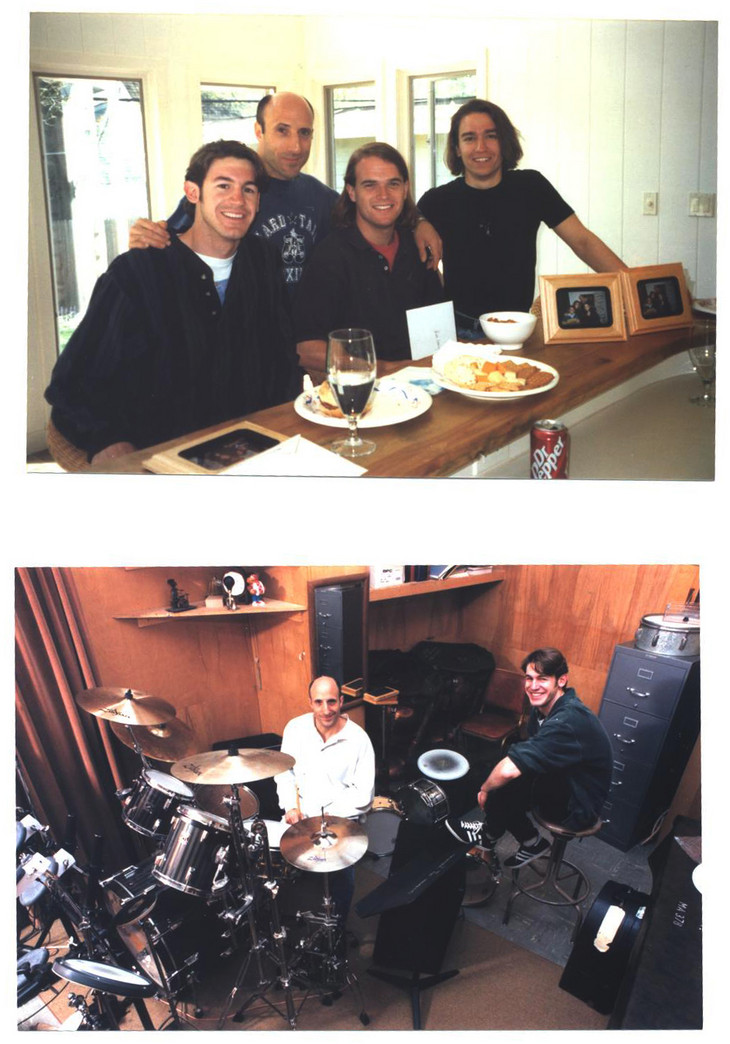 |
| Diehl, Aronoff, Leahy, Dupke (top) Kenny and Tommy in IU practice room (bottom) |
|
|
Ryan Brown (LA Studio) I still practice Kenny's exercises from the Ted Reed Syncopation book, where you would play a repeating pattern with 3 limbs, then read a page out of Syncopation with the other limb. Practicing that is SO good for independence and coordination. And the combinations you can practice are endless. He had me transcribe tons of songs to learn exactly what was going on. You can hear a song a million times, but when you really sit down and analyze drum parts it takes on a whole new meaning. Kenny really taught me to listen and be aware of everything around me when I'm playing. He taught me to learn tunes fast and to quickly chart them out. I still practice his 13 Hand Patterns exercises 16 years later!!! They are perfect warm-up exercises. There are so many aspects of his lessons I still think about when playing: how loud each limb is playing, feel, groove, drum parts, dynamics, and listening. I teach all of these principles. They provide such a good foundation. I love seeing students get excited about playing drums and being the guy that helps guide them through the world of drumming. There's nothing like having a student of yours play "Heartbreaker" by Led Zeppelin for the first time and seeing the look on their face, or playing them a King Crimson tune and seeing them freak out over it. I love expanding a student's drumming and music vocabulary.
|
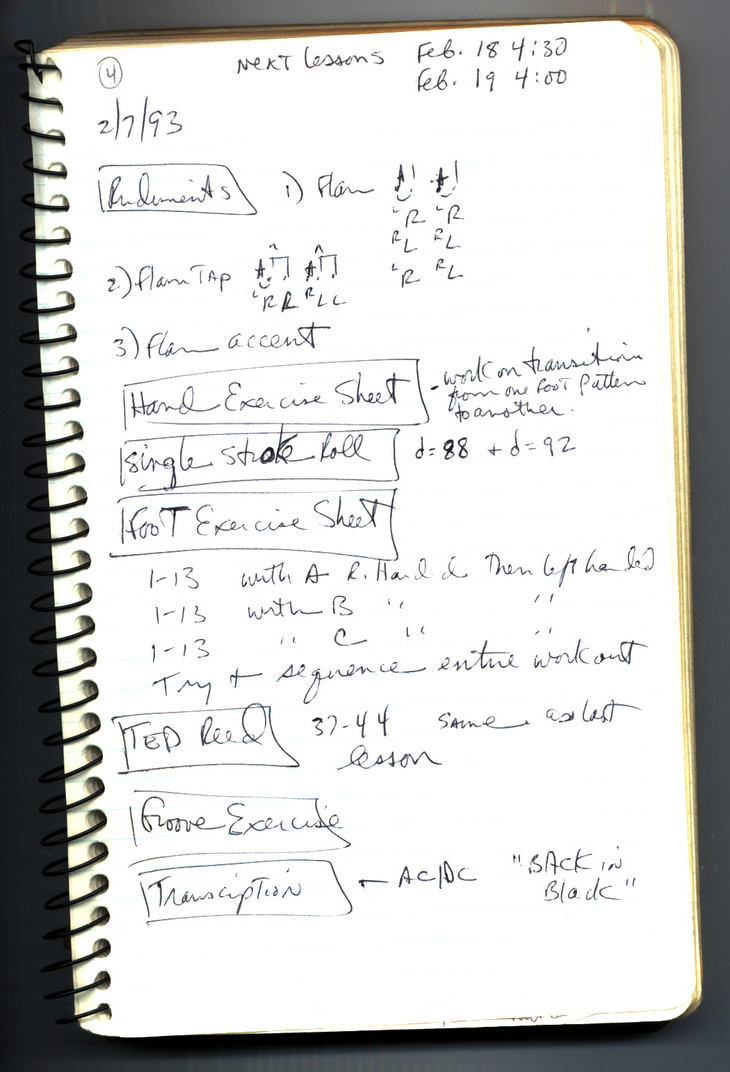 |
| Kenny's IU lesson plan circa 1993 |
|
|
Kevin Leahy (BoDeans, Sugarland, Zac Brown) Kenny’s hand and foot exercises helped to build up my speed and endurance. His athletic ability was also an inspiration for me – he’s a fitness and health nut, and you can see how it pays off for him. I try to stay in shape as much as I can, which always has a positive effect on my playing. He took the list of standard rudiments and went down the list, all the while playing a groove underneath. A big part of what he taught was centered on the groove – making sure that whatever fills or rudiment you were using; the sense of groove was never lost. In lessons he would have me play 4 bars of a basic solid rock groove, then play 4 bars of these types of rudiment workouts, then back into the groove. It was easy to tell if you were falling out of the pocket that way.
|
Pete Wilhoit (Fiction Plane) I still do his hand exercise warm up every time before a Fiction Plane show and I have learned how to be a "big rock drummer", trying to play on a big stage. It always reminds me of his advice ‘2 & 4 on the snare should be the loudest thing on the planet son!’ Kenny was always great at putting on a show. He made us all do his Power Workout from start to finish with no mistakes or you had to start again. Fun! Those have stuck with me and helped as a rock drummer. We also got into linear stuff and transcribing other drummers, which I still try and do once in a while. Mike Dupke (W.A.S.P.) Yep, the 13 Patterns thing is awesome; there's so much you can do with it. To this day, I love playing with them as a way to expand independence and consistency. And Power Workout is still so awesome-- I have it on my iPod, so now I can warm up with Kenny wherever I go!
Adam Farley (The Daylights, Sparkledrive)
I always warm up with those
first 13 lines constantly with all the feet patterns. I see it as
analogous to why pro athletes don't enter the arena and do something crazy
technique-wise from the start when cold. You want your body to be ready
physically as well as mentally before you actually kickoff. Also,
continuing the somewhat modified Kenny "Moeller" style for rock n'
roll really has been cool. It really incorporates a certain
swagger to the music when called for.
Clark
Becker (Freelance)
I really enjoy teaching the hand/foot techniques that Kenny applies to
the Stone Patterns. Along with
facilitating technique, Kenny made me realize that with any exercise you can
work on Time and Groove as well. So,
rather than practicing notes and patterns irrelative of groove it’s instead
about working towards a point where you are making exercises feel good. Sounds simple now but at the time, this was
quite an awakening! Oh yeah… and transcription…it’s very fruitful.
Kenny's 4 principles (Beat,
Time, Groove and Creativity) allow the drummer to
remember what's important and to sharpen the focus. But really, with any
piece of advice I've learned from Kenny I'll end up using it at some point with
a student... whether it's about drums or life.
|
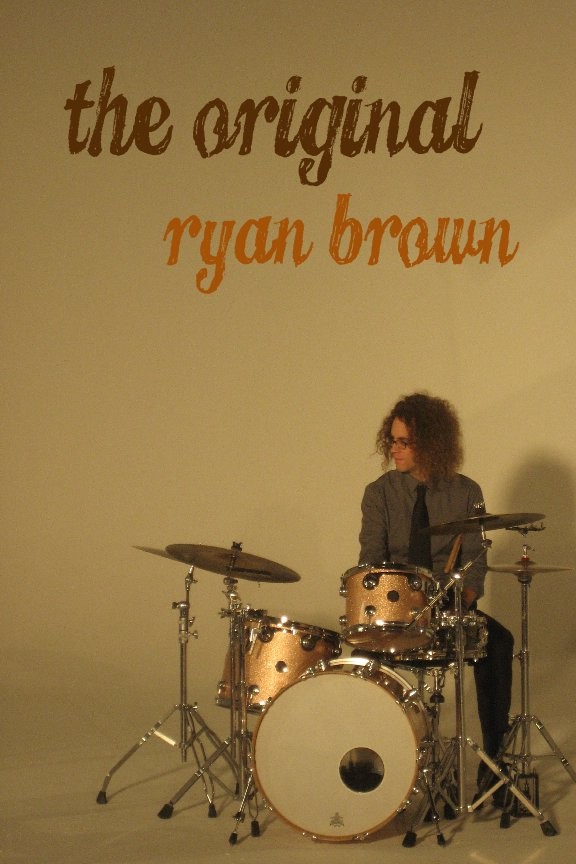 |
| 'Cause the cloned Ryan Brown just ain't as good! |
|
|
KA: Eventually they offered me the job as head of the percussion department at IU but I couldn’t do that as busy as I was. Running the department was a full time job. I wanted to do it in a way but I couldn’t do both that and my career. Steve Houghton is there doing a phenomenal job. He’s a great educator. His specialty is education. (Note: IU has assembled a world class and diverse staff for arguably the best percussion school in the world realizing George Gaber’s dream. Besides Houghton on drum set, John Tafoya teaches timpani, Kevin Bobo – marimba, John Spiro – percussion.) MS: Your influence is still felt at IU because the Aronoff Percussion Scholarship is in its 16th year. KA: What? The one we started, unbelievable, feels like it began only five years ago! MS: The scholarship has a lot of prestige for those kids. KA: I’m not as focused on me as much as helping a kid out and making them feel good. If they’re flippin’ out because they got it and like the fact it’s the Aronoff Percussion Scholarship, I like that. MS: Ryan, You received the Aronoff Percussion Scholarship the first two years it was awarded your Junior and Senior years. Ryan Brown: It was a huge honor to receive this scholarship, especially for two years. To be the first recipient of this was amazing. MS: You, Kenny and Shawn Pelton have also earned the Performer's Certificate for percussionists. I believe there is a separate jury for this award. Ryan: Yes, there was a separate jury for the Performer's Certificate. I believe I played all the pieces from my senior recital. It was a huge honor to be nominated for this prestigious award, and an even bigger honor to be awarded it. To have that along with Kenny and Shawn is awesome!
|
Below: Notice Kenny wearing 'South Park' hat. It says 'Oh my God, they killed Kenny!' Kenny used to live a couple blocks from the South Park Office Complex in Bloomington, IN...Coincidence?
|
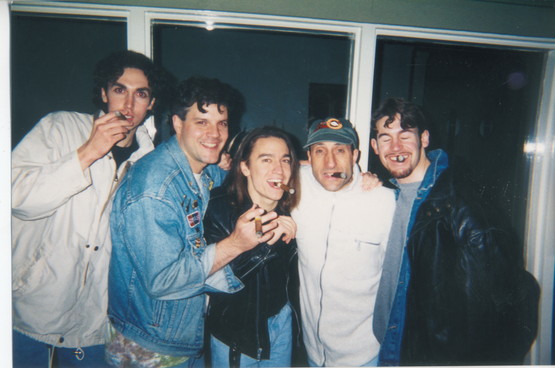 |
| Becker, me, Dupke, Aronoff, Diehl (photo by Wilhoit, Brown off preparing for Senior Recital '98) |
|
|
‘Be slow to fall into friendship but when thou art in, continue firm and constant’ Socrates Mike Dupke I always had this idea that we were like the X-Men. You've got Kenny as Professor-X, with the matching haircut! (laughs) Ryan Brown was the shy Rush fan who blossomed into a go-to guy working a million different gigs in L.A. Pete Wilhoit and Tommy Diehl are the powerhouse mainstream rock drummers with the greatest personalities in the world. Adam Farley is the workhorse, with maybe the most solid groove of any of us. Kevin Leahy was the funk-meister, also with a strong base in folk-rock. I was always the metal guy. There was Kenny, sending his minions out into the world to wage war! (laughs) Kevin Leahy Our common bond with Kenny has always kept us close. We’re always staying in touch, encouraging each other, and checking out each others’ shows when we can. It’s been great to share the excitement and disappointment we go through with each other. I’ve heard a number of bassists, guitarists and singers comment on how they envied our drummer brotherhood. I think we can see Kenny’s influence in each other to this day. Pete Wilhoit The real special times were when we all got together with Kenny. He was the life of the party and we had some epic croquet matches at his house. Kenny has always been a kid at heart and he loves hanging out with his students. It is always a good hang and he never really sleeps so you can always convince him to have fun!
Ryan Brown One of my first memories of IU was the jazz band audition my freshman year. I was REALLY nervous not knowing anyone there. Everybody was waiting outside the door to get called in. Then this girl walks by, I remember watching her walk all the way down the hall. She ended up sitting on the floor next to Kevin Leahy. Kevin, who I didn't know yet, was staring at me! I was already freaked out by the audition, then this happens! I kept thinking he was going to say something to me about me staring at his girl. Of course I met him soon after that and we became great friends. Kevin is awesome, but for about 3 months I thought he was going to beat the crap out of me!
Tommy Diehl Right away I met Kevin Leahy, Mike Dupke and Pete Wilhoit. Each of us brought our own style and influences to the mix and everyone could really play. IU is filled with top musicians of every sort and it was enlightening and inspiring to be surrounded by so much talent.
|
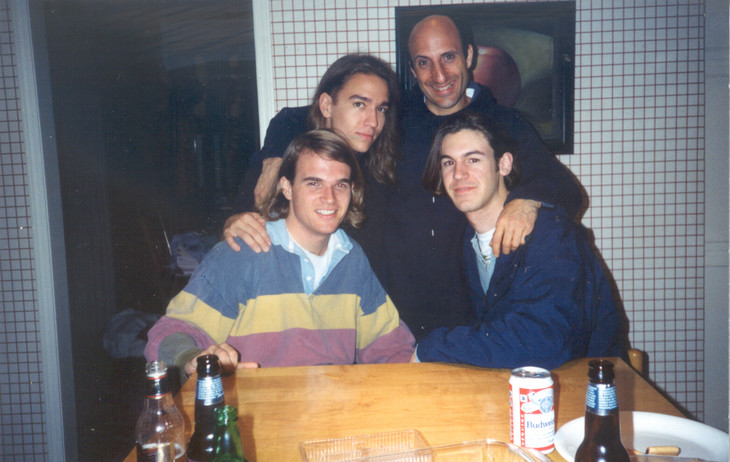 |
| ONE... |
|
|
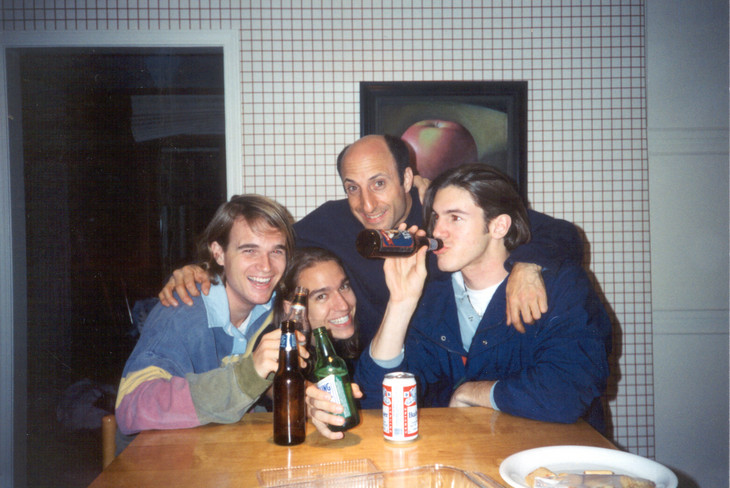 |
| TWO,,, |
|
|
 |
| THREE...(there is no FOUR...at least nobody's talking) |
|
|
MS: The infamous croquet game at your house with Jim Chapin witnessing you guys was quite a fiasco. KA: That was a serious ritual: a task at every wicket, do push ups, take a shot of whiskey, four gulps of beer and the last four wickets you had to play with your pants around your ankles. At one wicket you had to get up on the trampoline and bounce while hitting the ball off the trampoline. Then you had to make 2 out of 3 baskets before taking your next shot, people falling all over the place, neighbors going by waving, we’re wondering what they thought. Then we had a BBQ, watched crazy movies. Oh, debauchery! MS: You really made it fun for those guys. KA: I’m not gonna sit there and yell and scream at you in your lesson, it’s your career. You can have fun doing this but you gotta work hard, when I’m not around. Clark Becker, Pete Wilhoit both were not happy at IU, even Leahy. Some of the guys were ready to leave the music school and then they got me. I let them be what they were. When you go to IU that school will put you through hell. Most kids end up freaking out because it’s a very powerful school and it demands a lot out of you. I tried to understand each student as an individual. I told them, ‘You go at your own pace. If you want, work on the same thing for 6 weeks, that’s cool, but it’s your life and you really should get as much out of life as possible..which means learn as much as possible now so you can move on and learn the next thing..a heavy realization is when life hits you in the face, when you realize you’re lagging behind and no one else is pushing you but you. I always said, ‘It’s not about me it’s about you’. I was glad to help and inspire them. It’s cool; I love the Band of Drummers vibe. Shawn Pelton has been very cool staying in touch with me, more than any person I’ve ever met. MS: He told me he wouldn’t even have a career without you. I doubt that, but the way he said it he meant it. KA: I know, it’s unbelievable, what a thing to say! Shawn is an incredible person.
|
SHAWN PELTON (Saturday Night Live, Sessions) Shawn Pelton: When I went to IU as a jazz major there wasn’t a drum set teacher so I was lucky to study two summers in Boston with Alan Dawson and take drum set lessons with David Baker. I met Kenny seeking out someone to study drum set with in Bloomington. What was so wild about that time period was Kenny was all over MTV with ‘Jack and Diane’ and ‘Hurt So Good’. I saw Kenny going through stylistic changes from a fusion background to simpler playing and that was an incredible window of time to see what he was going through. He was also playing a lot around town. I would go and see him play, help him set up, tear down and load out. Thanks to his incredible giving spirit he was really open about letting me hang out. I learned so much just getting to hang and watch him play. His teaching at that time opened my mind to the nuts and bolts of studio recording in a rock context. The idea of hearing a song for the first time and trying to figure out what is the beat for the song, coming up with parts for the verse and chorus, understanding song form and developing actual parts. Kenny was a huge influence just for the sound he got out of the drums because he was aware of physically trying to project to the back row of a stadium. That kind of physical presence he had was so different than playing with a jazz trio at a coffeehouse. That was the early 80’s when people started playing a lot harder. Kenny had a huge sound combined with the attitude of playing simply and falling in love with that. Grooving and playing a simple pattern really dips into your spirit and heart. He was really in touch with that whole thing. I remember we used to talk about smaller kits and how the drummer comes across visually more than the actual drums. We discussed a drummer’s presence and personality, ideas that were way beyond paradiddles on a pad. He told stories of dealing with people and relationships. There was so much I learned from his real life experiences in the business beyond just how to approach tracks and recording. In the period that I was there, 82-88, Kenny was still formulating a lot of his own concepts. His thing was about finding a feel for the track in a song that was most appropriate. That was what mattered most…the song, the lyric, the feel, the sound, the spirit of the whole thing. That focus of playing for the song, having personality and a feel behind the drums, really amped up the importance of working on being a great musician, not just a great drummer. I don’t get a chance to practice chops that much because once you start working it’s more about getting a sound and coming up with parts in the studio with the priority of having a great feel. The reason why Kenny and his students work so much is they are aware of the importance of having a feel and what that has to do with working in the real world. Kenny always played from his heart and that was so huge … all of us that were around him have a part of that spirit. Seeing Pete Wilhoit play recently at the Mercury Lounge with Fiction Plane, you could really sense Kenny’s influence. He was totally committed and grooving, I was blown away. I saw Pete three years ago at Madison Square Garden opening for The Police. Seeing Sting at the side of the stage digging so hard on Pete was amazing especially since Sting has played with so many great drummers. MS: You played a heavy groove on ‘Behind Hazel Eyes’ by Kelly Clarkson. SP: That style of playing when I’m in that kind of bag, I am hugely indebted to Kenny. He’s a very physical, kick ass rock drummer. You know, I don’t think I would have a career if it wasn’t for Kenny. There’s a strain of my playing that he’s been such a huge influence on. Whenever I’m in that hard hitting kick ass physical bag his influence is like a tattoo. MS: You would have been successful without him but I understand. SP: Well I’m not sure if I would have ‘cause I do think a lot of the gifts he passed on really helped me. Globally, his whole thing about relationships with people, communicating and dealing with people in many situations was huge for all of us. Being sensitive to the vibe in a room…that’s more important than the actual playing. People that work a lot in sessions…they’re all great players but what separates Kenny is he’s a really great guy to be around. John Fogerty went through something like 30 drummers. He dictates the sound, he wants a certain thing. There are reasons why Kenny ended up on the recording. Kenny has the temperament and the attitude to be able to deal with a wide range of situations. That was a huge learning thing to be around Kenny because records are made a million different ways and artists all have their different ways of doing it. Staying flexible and being able to hang takes a certain temperament. MS: Kenny was asked to go home and practice during his initial recordings with Mellencamp but he stayed and learned from the other drummers on the session. SP: That was such an inspiration to see how hungry he was and what he would endure to learn. At the end of the day, Kenny always had this positive perspective of what’s best for his career. As a drummer, you’re almost always gonna be a sideman working for someone else, so there’s a real psychology to handling a lot of the conflicts and issues that come up in the studio. That was a huge lesson I learned being around Kenny all these years. The same situations are always gonna come up no matter who’s involved.
|
Pete Wilhoit Shawn Pelton taught me while I was in high school. He really blew me away. His feel, look, attitude, intelligence and language were all dripping with "cool". He is really something special and a true inspiration to me. I owe him a lot.
MS: Can you contrast Shawn and Kenny’s influence on you?
PW: Shawn came from more of a traditional jazz background, and always pushed the musicality of playing the drums. He would make me solo over a jazz standard with brushes while singing the melody. He always stressed that your entire body should feel the groove, like dancing. He's super smart, and great at bringing something special to the table. Kenny comes from being in a band for years and doing sessions with the biggest names in music. He has such a serious work ethic and his commitment to the drums is contagious. He is a very physical drummer, playing "big" and being the backbone of the music. He definitely taught me how to play to the audience and drive the band.
|
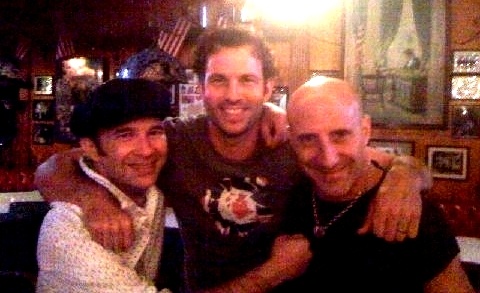 |
| Shawn Pelton, Pete Wilhoit, Kenny |
|
|
‘The only true wisdom is knowing you know nothing’ Socrates MS: You know I think you’re a great drummer but there are probably days when you think ‘Man, I don’t know anything!’ KA: EVERYDAY! (laughs) . I’m rarely impressed with my shit. Man, I wish I had more time to practice. I’m always practicing on the gig. I just did a Walter Trout record. It was a Texas shuffle and Walter’s like ‘Damn Kenny, I hired you to be a bad ass rock drummer but dude your feel, you got into the pocket of a shufflin’ fool. You are the shit!’ He’s right in that I did approach his shuffle song differently. I sat way back; relaxed, lightened up…it’s like acting. Like Robert De Niro, he’s a certain way in Taxi Driver and another way in Meet the Parents. He’s so brilliant, very in tune with detail and getting in the right frame of mind. He acts from his heart and not from his brain.
|
 |
| Kenny on Walter Trout Session..For Those About to Rock! |
|
|
MS: You get technically better, your groove deeper with an increase in power over time. I recently saw you play with John Fogerty and thought I knew what you were capable of…but you’re better and I want to strangle you! (Kenny laughs) There’s got to be some point where you decline but you always improve and it blows my mind! KA: Yeah, and I got more now. I’ve had to mimic monster bass drum guys for an ongoing project I have been a part of for two years called ‘Mix Me In’. I’m playing on three different drum kits. I have to be able to play every style of music imaginable. I have to be able to read and write music at the highest level…and my point is, yeah, I’m still growing.
|
Mike Dupke One of the coolest classes I took at IU was an acting class. I've always been a huge movie buff, but I was surprised at how I could apply it to drumming. Acting has you getting into the headspace of becoming someone else. So many times, I was playing with someone who said ‘We kind of want a Keith Moon thing’ or ‘we were thinking of The Police meets Pink Floyd’. I like thinking of not only what notes those guys played but how they carried themselves behind the drums, how they moved, what faces they made. Try to think of an animal when playing a groove. ‘How can I make this feel more snake-like?’ Just by keeping someone or something in mind can make a track come out completely different. Ryan Brown I listen to all styles of music all the time. I really try to incorporate that into my playing, no matter what kind of music I'm playing. You can learn so much from listening. Try playing a rock beat and playing a fill based on something from Rachmaninoff's Second Piano Concerto. Try playing a jazz beat and playing a fill based on an XTC song. It really keeps you fresh, and makes you come up with unique parts and fills for songs. I love reading about music and art history, and seeing how they coincide with each other. That is fascinating to me. Being a percussionist, you can find influences everywhere. I love just going outside and listening to what's going on: birds chirping, cars going by, someone hammering off in the distance...it's all percussion. You can really incorporate that into your playing. Listening is key!
|
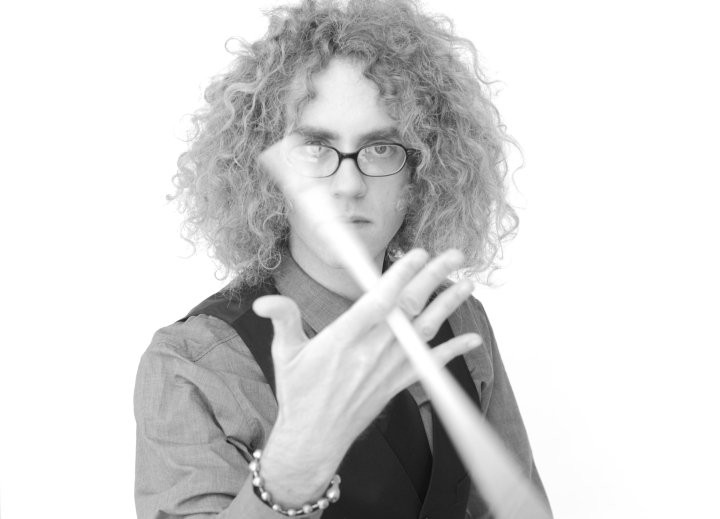 |
| Ryan Brown |
|
|
‘Wisdom begins in wonder’ Socrates
MS: You won a concerto competition at IU inspired by violinist Itzhak Perlman’s performance of the Introduction and Rhondo Capriccio. (performed by Kenny at IU when he was 22)
|
KA: I saw him perform it for his encore, a very virtuoso and beautiful romantic piece. I practiced it 2 hours every day for a year. It’s the only way you could do it. You learn all those fast passages very slowly with a metronome then increase the tempo every time you do a pass. As soon as you can’t play you back down again. It’s muscle memory. MS: Perlman’s one of my favorite musicians. You just never know what inspires people. Pete Wilhoit Being born and raised in Bloomington and taking a few lessons from Kenny at age 10, it seemed like my destiny to follow in his footsteps. He is the stuff of Bloomington legend. My parents thought I should get a lesson from the best. I was certainly in awe of this dynamic guy who had all these gold records.
Mike Dupke KISS was really the first band that caught my attention. You see the footage now of when KISS started to go really "commercial" in 1979 with the dolls and the TV movies. The hardcore fans were bummed that they were attracting 5-year olds. Well, I was one of the 5-year olds!! So Peter Criss was an early influence for sure, and Animal from the Muppet Show! A few friends of mine had drums, and I remember just connecting with the drum kit immediately. After 5 years of piano lessons, my folks finally let me take up the drums when I was about 13. I eventually auditioned for the music school at IU and got in. The head honchos, God bless 'em, put me with Kenny full-time. Tommy Diehl and I were the only Freshman given to Kenny, so we were pretty excited. Kenny took us through ideas that opened us up to playing in any style. The best stuff he told us were the most extreme situations he faced live and in the studio. While he knows the benefit of playing a simple groove, he still plays it with all the joy and heart in the world. You never get the idea that a simple groove is beneath him, you know? He really, genuinely LOVES playing and it comes through every time. Consistency was a big thing for me, having him show me the importance of being able to hold not only the volume and sound of a groove, but the FEEL of it through a whole song. It was never about playing a pattern as fast as you could. It was about being able to change something in a groove or a song and holding it, then using your ears to make good musical decisions! I once told Kenny I wanted to have as much energy behind the kit as possible. He said he understood, but there was a way that lets you stay relaxed as well so you can focus easier. It took me years before I really grasped what he was talking about, but he was right. On the day of my senior recital, I had been up all night, getting the room ready. The time for my timpani piece comes, and I realize I forgot the sheet music! I just improvised the whole thing! I don't think anyone noticed!! (laughs) I had already played the piece correctly for the percussion department ahead of time. Oh well, the show must go on!
Adam Farley
I met Kenny after enrolling at IU, asked him if I could study with him and he said ‘Cool!’ Before IU, I saw Kenny in Modern Drummer and occasionally on TV. I remember him playing ‘Love and Happiness’ with Mellencamp for a live awards show. I was blown away by the power and command he had of the drum kit. I later saw him do a drum clinic at PASIC Convention where he really showed his chops and technique. Upon finishing his incredible drum solo he said, ‘You didn't realize I could do that, huh?’ A year later I was accepted at IU and within a week was in his studio.
|
 |
| Adam Sea Whan Farley |
|
|
Ryan Brown I saw Gregg Bissonette give a drum clinic when I was 12. I had no idea what a drum clinic was, or who Gregg was for that matter! I went and was totally blown away. I remember saying to myself ‘That's what I want to do. I want to be that guy!!’ The impact Gregg had on me that night was monumental. The next huge moment for me was seeing RUSH on the Presto tour when I was 14. That basically sealed the deal for me choosing drumming as a profession. I looked at many different universities searching for amazing jazz programs. IU popped up on my list, with the legendary David Baker heading the jazz department. When I found out Kenny was teaching there I couldn't believe it. What an amazing combo: getting to learn jazz from one of the most famous jazz educators of all time and studying drums with one of the greatest rock drummers alive. I had to meet Kenny at his office to set up lessons. I was REALLY nervous!! I remember waiting outside the door while he was finishing a lesson, thinking ‘Holy crap! Kenny Aronoff is in there!’ He opened the door and was the nicest guy in the world. He immediately took me under his wing. Kevin Leahy During my Freshman year I ran into Kenny off campus outside a bike shop. He blurted out ‘Why do you play drums?’ I quickly racked my brain for an impressive answer about rhythm and music... but before I got a word out, he exclaims ‘You play to get laid.’ I’m sure he saw a startled look on my face, but he continued. ‘I’ve got too many students who think from here,’ he said while grabbing his wrists and arms. ‘You got to think from here,’ this time grabbing his crotch. I just started laughing, wondering what the hell was wrong with this guy. Eventually I realized what he was getting at – there has to be an element of fun in what you’re doing. I spent a long time putting so much pressure on myself to “make it” in original music, I lost touch with why I had gotten into music in the first place. That part I always saw in Kenny – when he sits down behind a kit, you can see that glow of a 15-year old playing along to Led Zeppelin records for the first time.* When I auditioned for the BoDeans, I like to think a big part of winning that audition was my enthusiasm. Tommy Diehl I'd been accepted to IU as a classical percussionist but immediately changed my major to Jazz so I could study drum set. I realized I didn't want to graduate and go join the symphony. I wanted to lug my drums set to clubs and play rock and roll! No tuxedo, no music stand - jeans and a t-shirt and loud guitars.
First semester was cool, I was learning a ton about jazz, classical music and theory, but what I was really there for...playing the drum set, wasn't exciting. I was thinking of leaving IU. Near the end of my first semester I heard Kenny Aronoff was going to start teaching there and I headed straight for the department office and landed one of the few spots in Kenny's studio. That is exactly what I was looking for. Kenny taught at IU for four years and I studied with him for all four. At that time in my playing I was into fast, flashy players, the more complex the better. It's funny, initially I wasn't sure what studying with Kenny would be like - I didn't think of him as a flashy player, but within the first few lessons I discovered just how deep of a player he was. Kenny showed me that all those fancy fills are meaningless without solid time and groove.
Kenny also taught this basic principle: Knowing WHAT to play is as important as knowing HOW to play it. When you hear a song on the radio, you may think to yourself, 'Oh, that's easy, I could play that.' What you don't realize is the hard work and skill that went into creating that simple, memorable drum track that fits perfectly with the song.
Kenny constantly blew my mind with his sense of groove and power. His lessons were challenging and really kicked my ass, but they were fun as hell too...I couldn't wait for each one. Clark Becker My brother-in-law told me, ‘Hey, Kenny Aronoff is teaching at IU.’ Growing up in Indiana everyone knows about Mellencamp and Scarecrow was one of the first albums I owned. Finding out that Kenny was at IU was quite exciting. Next I secured a plan in my head: Transfer to IU, get into the Music School, study with Kenny. Sounds easy right? Fortunately, when you're young, ignorance of how things work in the world is the biggest blessing you could have!
|
CLINICS MS: A lot of kids initially learn the drums in a drum store or thru the clinic experience. Jim Uding (Former Owner of Drum Headquarters, St. Louis, MO) Lesson programs are critical to the stability of any music store. It generates traffic and creates activity. It’s part of the atmosphere. Most drum shops and independent stores create a community. Lessons are part of a commitment to that community which not only elevates the art but increases the number of people involved. It improves the quality of life for musicians and the music scene in general. It generates drummers, being drummers ourselves that makes it interesting and rewarding for us. It takes a typical retail environment and turns it into something more artistic with depth. When you inject a drum clinic or master class it’s a breath of fresh air. It gets you dreaming about what you want to be and excited about what you want to do. It gets you up close and personal at a level that you don’t normally get to experience and its motivational and inspirational. Someone like Kenny Aronoff, with his energy and personality can get anybody excited. He’s not just saying LRLR, RLRL, he talks about the passion behind it. It’s one thing to master technique but what keeps people drumming is the passion. I think everybody feels that but I don’t know if they realize that passion and excitement is normal until they’re around people who also express it. When you experience someone like Kenny who not only expresses it but actually executes it on stage in front of thousands of people its validation that it’s ok to play hard and say ‘I’m a drummer and proud of it!’ You and I were able to experience Simon Phillips, Dom Famularo, Kenny Aronoff, Terry Bozzio and others as independent artists where nowadays the kids are influenced by drummers who are simply members of bands. They’re not getting that example that it’s ok to be a drummer. There’s just so much information today and its trickled down to music. They’re not seeing it as independent artists. They think ‘I can’t make an impact as an individual, I’m just a member of a band siting in the back.’ It’s almost like going back to before Gene Krupa and Buddy Rich brought the drummer out front. Unfortunately, there are a lot of kids that got that impression and don’t look deep enough and keep the ball rolling. Clinics help, its fuel for the fire to dig deeper for inspiration. In addition, the annual ‘Big Beat’ which benefits school music programs, gets a lot of drummers playing simultaneously across the country, further enhancing the drumming community. Mike Ehrhard (Teacher, St. Louis, MO) Nowadays you see a whole generation of players emulating Kenny, that arena rock sound. As a player Kenny’s knowledge is gold. He understands what it takes to be successful and get the job done. He’s taught me to put the focus in areas that are more practical. A lot of players aren’t interested in what you’re doing but Kenny cares. He shows you that anybody can do it with the right discipline, passion and attitude. MS: Kenny, you still do clinics all over the world. KA: I like doing it. In one night I can perform 10 pieces I’ve recorded with 10 different artists focusing on drums and different types of music. It’s really enjoyable for me. I like to share my ideas and philosophies. It’s a great experience. It’s hard work, that’s for sure. I try to get people to be great at whatever they choose. The three steps to success in my book are hard work, passion and education. It’s easy to work hard when you have a passion for it.
|
 |
| Pete Wilhoit of FictionPlane |
|
|
‘The greatest way to live with honor in this world is to be what we pretend to be’ Socrates Mike: How has Kenny influenced you in music and life? Pete Wilhoit Besides all the obvious physical technique that he teaches you, his absolute commitment for what he is doing translates in every lesson. If he’s showing you how to play a linear line or if he’s talking about life on the road, he’s 100% into it at all times. He made you realize that professional drummers should be taken seriously! Most of all, he inspired us all to want to succeed as professional musicians. To hear him tell you stories from studios and life on the road was the real fuel we all needed. He was also coming from a classical background and made you appreciate that side of music as well. His energy level is like nobody I have ever seen. He’s like 1,000 Energizer Bunnies. He is always hustling gigs and finding a way to stay busy with the best artists in the world. He makes you realize how hard work and commitment really pay off on every level of life.
|
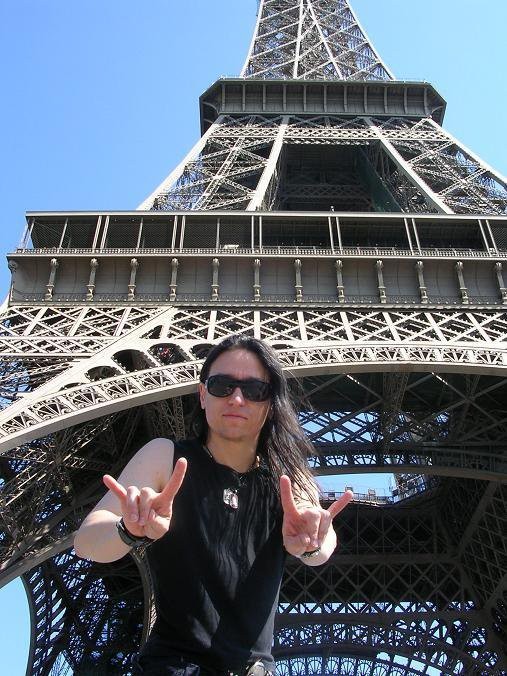 |
| Mike Dupke and Le Tour Eiffel during another European W.A.S.P. tour |
|
|
Mike Dupke When you spend that much time with Kenny, you realize why he works as much as he does. He’s got it all…he’s reliable, has a great ear for music and is so much fun to be around! Personality plays a huge part if an artist or a producer wants to use you again. He taught me patience. I remember one lesson with him where I was bitching about not really moving up the ranks in the jazz department and how heavy music seemed to be frowned upon quite a bit there. Kenny told me he was 35 before even starting to become the session monster he is today and if I worked at it I would find success. Kenny always said ‘work hard and have fun’, that’s what I try to follow. Always play your best because you never know who is listening. Adam Farley Musically...to always stay current. Know what your strengths are and what you need to improve. There is no limit to improving & every situation is a good situation because you are always learning. Always remember the core reason of why you play the drums and this will fuel your passion for the instrument & playing.
I remember a group lesson with all the guys in his studio at school and he said, ‘It's possible that if you continue in this business, situations will arise and people will try to bring you down with negative comments, etc. When this happens, just realize that their words are them throwing little twigs and sticks at you.’ Kenny taught me to have many options. I'm always carrying in my mind a reference encyclopedia of beats, feels, vibes to make the music as best as it can be. This comes from absorbing all styles of music and really authenticating whatever is called for musically.
Kevin Leahy I saw firsthand how much passion someone can have for music and drums in particular. Anyone who has met or studied with Kenny can tell you about his unbelievable positive energy and vibe. The reason Kenny has had such an effect on so many musicians is because of his attitude. It doesn’t hurt that he’s such a monster player. You feel better about yourself and more motivated about your own playing when you’re around him. When I play nowadays, I make sure that I’m focused on what I’m doing and that I’m in the right frame of mind. I started simplifying the way I play. I started to really listen to what I was doing. We often hear that less is more. What I think is more important, however, is being in tune with what’s appropriate for the situation. Kenny had me transcribe pop and rock tunes, which helped me understand what worked best in different situations. He helped me hear the overall arrangement of a song and apply the best groove to support that. It really helped me understand how to come up with parts for original songs. I think Kenny was great at knowing what I needed to do during different stages of my development. I used to go through a lot of periods of self doubt, especially in college, unsure about pursuing music as a career.. Kenny enabled me to trust myself. Often I would come into a lesson and Kenny could tell I had a lot on my mind, so we wound up just talking. On a number of occasions my lessons became therapy time. Kenny knew that I wouldn’t be able to accomplish much if I was preoccupied. Over time, my mind was clearer and I’d get a lot out of my time behind the kit. It can be tough to make a living in music. One day you’re on top of the world, the next you’re looking for a new gig. I’ve been in and out of enough projects to realize this. Kenny was much more than a teacher – he was a mentor, coach and friend. I still think of him when I’m in tough situations – like imagining your old high school football coach yelling at you to get up off the ground, wipe the mud off your helmet and get back in the game. Kenny has made an incredible career out of seizing every opportunity he’s presented with – often not knowing what he would be doing in 2 or 3 months. That trust he has in himself is always an inspiration to me. Outside of my family, Kenny has had the biggest influence on my life.
|
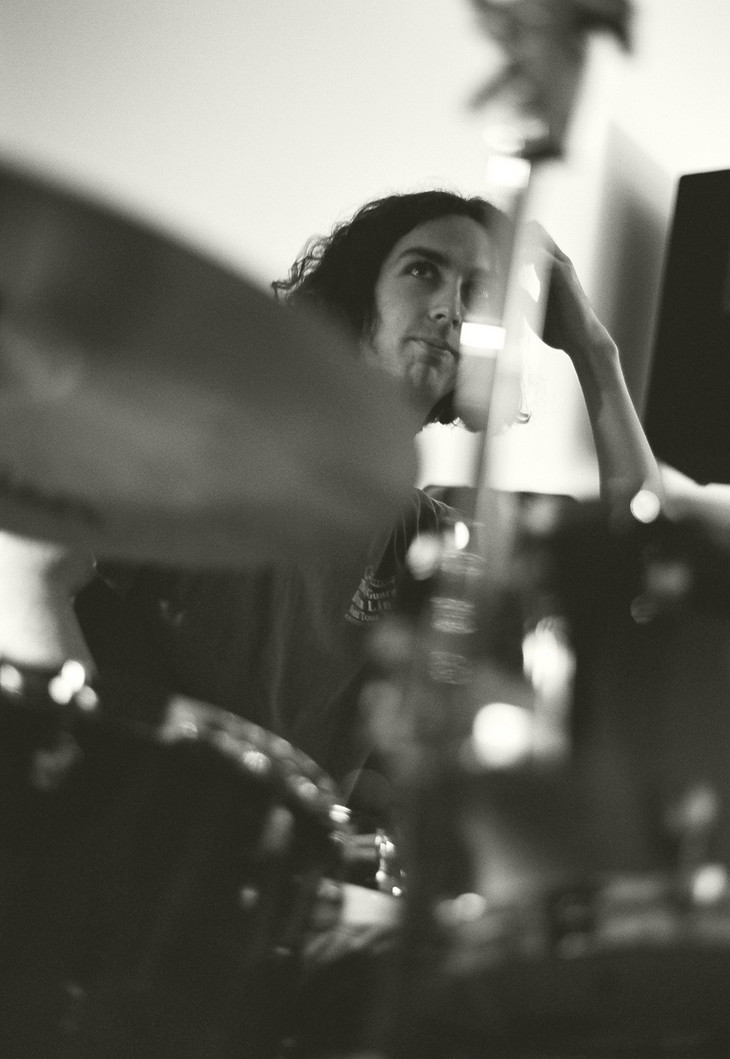 |
| Clark Becker |
|
|
Clark Becker Kenny's foundation, like any master at their trade, lies in the strength of his attention to detail. When it comes time to perform, Kenny is way beyond the parts of the music and is encompassed in the whole. He is the only person I know who has a simultaneous Right Brain - Left Brain interaction at such a high level. Another one of his great concepts is ‘Work on one thing until it's at an A+ level instead of doing 10 things at a C- level.’ There are so many things to learn, one could never cover them all but you can take what you like and strengthen what is yours. I took his principles for drumming and applied them to all phases of my life -the work, dedication, sacrifice, positive attitude and energy. I remember coming into a lesson one week and telling Kenny that I didn't have much motivation for rehearsing. He told me he doesn't go into the practice room full of energy and enthusiasm every time. He said it's easy to practice when you are feeling good, but the real work comes with the day-in, day-out routine and the time you put in no matter how you're feeling. This was an epiphany for me! Kenny took my raw ability for playing drums and made me understand what I was doing. I drilled a beat or a song over and over again until I could really play inside the song. I'll never forget the moment when I was playing along with a track that I had transcribed and I had finally put the mechanics together so that the groove could come out at a consistent level and Kenny said to me ‘You're getting it.. .you're playing makes me want to keep listening.’ Kenny is such a positive influence... such a great listener and a pillar of strength for everyone around him. He is an amazing mentor, teacher and friend. I'm forever grateful.... to think that here is this world-class famous drummer taking time out to teach some kid from Indiana. It's truly amazing! Tommy Diehl Kenny is the guy that people want to work with not only because of his exceptional playing but also because of the arena-full of positive energy he brings. When Kenny is around, you know you’re going to get a serious top shelf musical performance and have a great time. His work ethic and positive attitude are major components of the Kenny experience. Kenny does a ton of preparation for his performances. I recently took another lesson with Kenny at his practice studio in LA. The focus of the lesson was “Preparation”, what he puts into learning material for live or studio situations. Kenny showed me his charts for an upcoming live performance with Jon Bon Jovi. They were so detailed, he’d spent hours writing and refining them, he’d then go to a rehearsal, see what changes were needed, then go back and rewrite the charts again, and maybe again after that. Kenny makes every possible effort to ensure that each performance is exactly what the artist wants and is his personal best. Kenny was the top Rock and Session drummer in reader’s polls all through the 90’s. He would show up to a lesson straight from a recording session with Jon Bon Jovi or Iggy Pop or from tour with Melissa Etheridge or Bob Seeger. He could tell you exactly what direction John Fogerty had given him in a session that led to the final drum track. Studying the old Jazz masters for my degree provided a great foundation in drumming history and instilled a musical lightness of touch and feel, then Kenny added a very current connection to Rock and Roll. Ryan Brown Kenny is such a positive guy and is so fun to be around! He really enjoys every moment and is full of energy. He has had a huge impact on my life, especially since I started studying with him when I was 18. At that age you just soak up information and he was the perfect guy to be around. He is definitely one of the biggest influences in my life.
|
‘All men’s souls are immortal but the souls of the righteous are divine’ Socrates
“Every human soul who walks the earth has something to give to you and you, in turn, have something to give back.’ George Gaber ‘I figure you live and you do the best you can while you’re here. Maybe we do end up somewhere else in a spiritual way and our life is more like a billion years and we just keep evolving into different things but when I come back as something I won’t remember who Kenny Aronoff the drummer is, I can’t imagine.’ Kenny Aronoff ‘Drumming is a trip because it’s a window into someone’s heart and soul. You can instantly feel where someone’s coming from behind the drums. Sometimes the simplest beats can communicate the biggest amount of groove and attitude.' Shawn Pelton ‘This life of music requires passion, dedication and determination to such a great degree that it nearly consumes you, but the payoff is overwhelmingly fulfilling and worth every bit of hard work.’ Tommy Diehl
CONCLUSION If a percussive Big Bang birthed the groove we celebrate today, Saul Goodman (etymologically the ‘soul of a good man’) provided the matter at its core. His passion exploded in the playing of Vic Firth, Arthur Press and George Gaber. They found the perfect vehicle in Kenny Aronoff to transfer the energy and discipline to drum set and teach the next generation to radiate rhythmic grooves throughout the known universe.
Socrates was executed for allegedly corrupting the youth of his day, a youth which subsequently dreamed up the future. Oh, how he would have loved Kenny Aronoff!
|
Shawn Pelton Shawn Pelton has recorded with a wide range of top artists and established himself as a first call player since moving to New York in the late 80’s. Known for his great feel, deep soulful pocket and a high level of musicianship across a broad range of styles, Shawn has recorded with artists such as… Bruce Springsteen,Van Morrison, Sheryl Crow, Elton John, Billy Joel, Rod Stewart, Johnny Cash, Roseanne Cash, Pink, Shakira, Kelly Clarkson, Five For Fighting, Michelle Branch, Regina Spektor, Tears For Fears, Citizen Cope, Matisyahu, Jonathan Brooke, David Bryne, Edie Brickell, Marc Cohn, Richie Havens, Joan Osborne, Hall and Oates, Odetta, Pavorotti, George Michael, Carly Simon, Dixie Chicks, Chris Botti, Buddy Guy. ....... as well as several Grammy winning albums including Ray Charles, The Brecker Brothers, Shakira, Shawn Colvin, Les Paul and the Hank Williams tribute album with Bob Dylan. Such a broad discography shows a rare ability to be at home playing on a top ten track by Pink, recording with Jazz legend Abbey Lincoln or an Icon like Bob Dylan. When he isn’t under headphones Shawn can be seen as part of the prestigious Saturday Night Live Band holding down the drum chair since 1992.
Tommy Diehl Kenny definitely helped me get my foot in the door after college. Kim Fox (Dreamworks) and Acoustic Junction (Capricorn) were both signed nationally touring bands Kenny recommended me for...I did the auditions and got the gigs. It's a great leg up to be the guy Kenny recommends. I also spent about 7 years touring/recording with 'Spookie Daly Pride' (Funzalo). I maintain a busy schedule performing and recording with artists in the Northeast and LA.
|
I'm really excited about my current band, 'InAshton' out of New York City (inashton.com). We released our first album InAshton: (Red) in 2010. Our second album is mostly written/recorded for 2012 release. There are more great videos on the way and the momentum is building. The live show has a killer energy and my goal behind the kit is to always lay down solid grooves with power, intensity and a great feel.
|
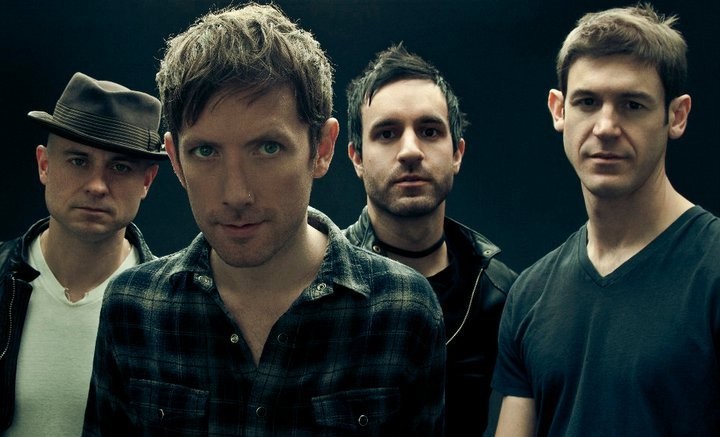 |
| InAshton - Mr., Morgan,Tony, Deal (Tommy Diehl) |
|
|
Pete Wilhoit My first band, The Cutters, formed in Bloomington in 1991. We got signed to BMG and did a US tour in support of Sonic Wave Love. We had four releases over an 11 year career. During that time I also played on over 35 studio albums and played live with Michael McDonald, GE Smith (SNL) and Jazz great James Moody. MS: I really enjoy FictionPlane, your rock band with Seton Daunt and Joe Sumner. How did you get that gig? PW: Shawn Pelton worked with producer David Kahne, who did FictionPlane’s first album (with Abe Laboriel Jr. on drums). He told Shawn that FictionPlane was looking for a new drummer. Shawn suggested me. I listened to the music and instantly fell in love. I called their management and arranged an audition, drove from Indiana to New York City and got the gig. It was a life changing event for me. MS: How do you feel your training has helped you to play quiet when necessary and ramp it back up for full tilt rock? PW: The jazz side of me really helps me approach it with a full range of dynamics. I do a lot of finger exercises and use a lot of grace notes. They help me groove more at lower volumes. The full tilt rock actually took more time to learn. Playing as big and hard as you can uses muscles that aren't usually used in drumming and you have to train yourself to groove while using much more distance between your hands and the drums. It takes a lot of building up the stamina as well. MS: It’s a Lie from the Paradiso DVD really captures the energy of a real rock band in my favorite format, the trio. PW: That Paradiso gig was so special for us. We had played the small room a year earlier and made it a goal to sell out the big room a year later. We achieved that goal and it was caught on tape and made into a DVD. It was a really fun show for all involved.
|
MS: I'm a huge Police fan, however, the thing that impressed me about Fiction Plane was not that you opened the show in 2007, but that you sold your set to an audience that, like me, was unfamiliar with your music. PW: Over the past 7 years we have become very use to being the support act. You quickly realize that you only get a moment to borrow a crowd’s attention. We really try to push energy off stage with our live show. Being the opening act, we tend to play music that lends itself to a big live show which usually gets people watching. Once you have a crowd then you hope they like what they hear. Although we love being the headliner, we have enjoyed warming up crowds all over the world, and it has certainly helped us gain fans which is the ultimate goal! We recently released our third studio album SPARKS and are currently on tour. Adam Farley MS: You Tube has your performance with the Daylights on Craig Ferguson, which really shows your Rock groove and some tasteful playing, what of your IU experience got you to that style?
AF: My intention at IU was to play "total percussion", orchestral percussion and rock n' roll. When I was in The Daylights, the drum beats I created were very much from the studying I did at IU. Orchestration is a big thing for me. I'm always thinking in terms of parts, layering, supporting other instruments, and at times taking the lead. The Craig Ferguson performance, I think, shows several of those qualities: supporting in an "orchestra-like" sense even though it's rock music and the band is a trio, plus the lyrics are paramount to the song. The groove aspect is unique in that it's a maturity thing. Beat, time, creativity, are aspects you can really implement immediately somewhat. The groove though is like a bottle of wine becoming a great bottle of wine with time. It's such a great analogy that Kenny made because your playing reflects who you are and your spirit shows in your playing. I think if anything, that clip just shows where I was at in my career at that time.
|
MS: I also saw you reading in a clip. How important is that to your career?
AF: Reading music has proved to be my lifeline. When creating beats, I want to remember what they are. I don't want to ever forget what I did, especially during those times when you come back to rehearse a part. If you want to change something later, fine, but I like that security of knowing exactly what I'm doing. It's also the only way for me when you're juggling so many different things. I moved to L.A. with The Daylights back in 02', we were gigging toward getting our record deal. I got a call to fly back to Nashville to do one show with country singer Mindy McCready whom I toured with a year earlier. I just pull out my Mindy charts, hop on the plane and have all the music written out from the previous tour. It's great!
MS: You list Bach, Stravinsky, Davis and Coltrane as influences, can you elaborate?
AF: We wouldn't have modern music without counterpoint in Bach's music. Stravinsky with his odd meters, atonality; the music was so different people rioted, goes to show how music can really affect people's thoughts & actions. Miles Davis and John Coltrane because like Bach & Stravinsky, they were Magellans of modern music. Miles creating 3 different styles: cool, modal, fusion. Coltrane later got into free jazz which was an extension from be-bop, modal, etc. To me, these composers have given me personally, more depth to playing music which affects how I play music.
|
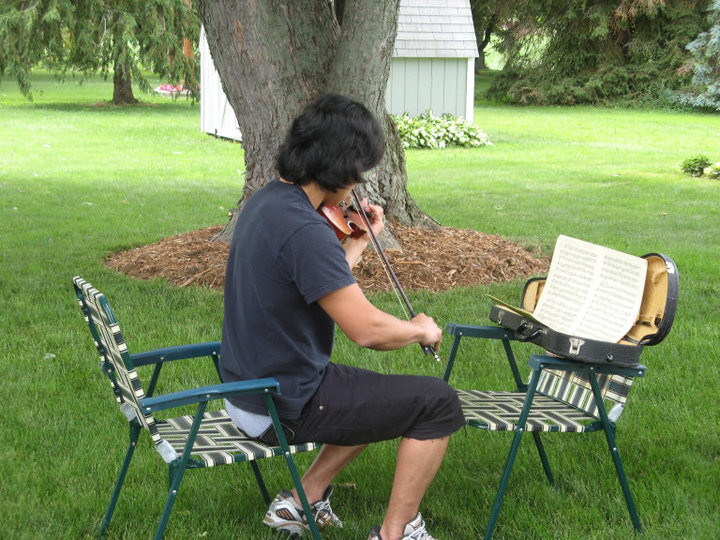 |
| Adam Farley incorporating his Classical influences |
|
|
Clark Becker I'd like to thank my mother and family for surrounding me with music when I was very young. Growing up in Lafayette, IN, my entire family was involved in fifing and drumming. It was normal fo me to travel and play music since 5 or 6. I have a picture of myself beating on a rop-tension drum when I was about 7 years old, wearing jeans and a tank top...nothing has really changed (laughs)! The whole nature vs. nurture thing, right?
I started drum lessons in 4th grade but quit after 6 months. Looking back, I regret that decision but it was eventually the path I would take. I played along with albums and learned from my sister's boyfriends, not taking formal lessons again until I attended IU.
I hung around Bloomington for a year after IU to play the bars and then made the leap to LA. I managed to keep my own band while playing for singer songwriters on the side. I was fortunate to tour the US and UK with independent artists. LA provided the opportunity to play with musicians from established touring groups and those artists in film and TV, which led to my BMI affiliation and my pursuit of my passion for songwriting.
The high point in my career, thus far, was doing a session with Kenny Aronoff. SoCal Blues artist Andy Walo was playing with Kenny about once a month. Kenny hooked me up full time with Andy. Kenny was packing for a John Fogerty and asked if I could get across town and play a Blues/Rock gig that he already started! I showed up midway throught the set...setting up my drums while they were playing. The bass player, Roger Bueno, toured with Kenny in Asia supporting phenomenal guitaritst Philip Sayce (Melissa Etheridge). Roger and Andy are amazing musicians and my Rock/Blues-based feel complemented them well. Back to the aforementioned session...Kenny was loading in (we each did a few tracks) while I was trancking and he asked "Are you playing to a click?"..I said no, I just had a great teacher!
I played the Long Beach Blues Fest with Andy. We opened for Booker T and I told him how much of an influence he was on our trio. He said to me 'That was you playing before me?...I had to stop what I was doing and listen to you guys!'...I'll never forget that.
A few years back I left for France with a few LA bandmates to form a new band over ther and gig...tour...live together, the whole bit. That didn't go exactly as planned but it afforded me the chance to go back every summer for the past three years to play fothe French Rock fans.
I recently moved back to LA to pick up where I left off and to pursue this passion that has been inside me since I was a kid!
|
Mike Dupke MS: You had the unique opportunity of playing with Kenny in John Mellencamp’s band, how did this happen? MD: Mellencamp had just released his "Human Wheels" record, and Kenny put extra percussion on it so John wanted an extra guy up there. John had season tickets to Indiana Basketball home games and saw me in the Pep Band. He asked Kenny, ‘What about that kid?" Kenny said, ‘That's my student!’, so I was in. It was a blast. I was 19...it was my first taste of a real career and I loved it. MS: Later you had a cool stint with one of my favorite musicians, Blues Rocker Eric Sardinas. MD: I had some homework to do on that one! I had never set out to be a Blues drummer, but I did want to be Eric's drummer. Eric wanted to make sure I knew where he was coming from, so he exposed me to a ton of classic Blues material. Eric brought me my first chance at international touring. He's really an amazing player and performer.
|
MS: You left a secure position with Eric to pursue a heavier career, a risk, but one that paid off big..W.A.S.P., a dream gig for you. MS: Yeah, eventually!! (laughs) I didn't know W.A.S.P. was in front of me when I left! I had some great years with Eric and I'll always be grateful to him for taking me on, but I missed being able to hit hard and beat the hell out of my kit. I just wanted my next move to be BIG. The chance came and I just zeroed in. I thought bull’s-eye man, this gig is MINE!! MS: I know you have other influences like Gene Hoglan, Joey Jordison, etc. How have these affected you playing? MD: Gene and Joey are awesome, man. I'm a big Slipknot fan and Strapping Young Lad is probably my favorite band of all time, next to KISS. Those guys come up with such killer parts that you hear their creativity, not just their speed.
RYAN BROWN MS: You have become quite a studio musician and Marti Frederiksen among others has used you on many recordings. RB: I have been very fortunate to play on a lot of really cool sessions. I absolutely love recording, and that's what ultimately brought me to Los Angeles. Working with Marti is so much fun. He is an amazing drummer himself, so we have fun coming up with cool parts together. I also love working with Rob Seals, another LA producer. We have developed this technique where we track numerous percussion instruments on the same song so they completely interact with one another. When you listen to it, it sounds as if it happened at one time, but we spend lots of time figuring out the perfect parts and percussion instruments for the song. It's so much fun building a song that way and it's definitely unique. We use everything from traditional percussion to pots and pans to the lamps in the room, to...whatever! The most important thing is to give the producer what they want to hear. If they want to try 17 different beats in the second verse, then do it! You never know what is going to work best until you try it. I've heard countless stories of drummers only doing one or two takes, not willing to try different parts out for the producer. Be open to all ideas and let the parts develop organically. I love that part of the process and I love taking the time to find the best parts for the song. Your chorus pattern may be the best, but the producer's verse pattern may win, and the guitarist's bridge pattern may win. It's not a contest; it's about what works for the song.
|
MS: I have seen you play in LA on the Strip and at a Sex Tapes (Chris Pitman, Kelly Wheeler and Marko Fox) band rehearsal. You even have a popular 70s cover band, AM/FM, and quite a diverse live resume including Chyi Chin, Ultraviolet Sound, Penny Relentless and J Naugh-T, my point; you play almost every style of music imaginable. RB: I LOVE playing all styles of music. I would never want to just play one style. It's so much fun having an indie rock rehearsal with my band Madras, then a folk rock session, and a jazz gig all in the same day. I really think if I just played one style all the time I would get bored. Playing all styles keeps me fresh and on top of my game, and lets me incorporate elements of them into each other. The best mix of that for me is a band I play in called The Fuxedos. We play every style you can think of...sometimes in the same song!
|
KEVIN LEAHY MS: Your initial professional job was with Billy Pilgrim. How did you get that audition? KL: I got a call from Kenny that Billy Pilgrim was in search of a drummer to tour with them. In June of ’95 I won that audition. It was a great experience, and it was a thrill to feel like I had made a step up in my music career. I got a lot out of school at that point – going back, I had a ton of questions for my professors, especially Kenny. I was frustrated that I had put so much time and energy into music, but the record business seemed to care very little about that. I was pretty bitter and frustrated, but the great thing was Kenny had been through all of that – time and time again. He was able to help me focus on why I play music in the first place – and he was able to help me keep everything in perspective. MS: You’ve since played with Shawn Mullins, Sugarland, BoDeans.
KL: I met Shawn through working with Billy Pilgrim and was asked to play on his Soul's Core record. Plus, Brandon Bush (keys) and David Labruyere (bass) were called in to play on the project. Brandon would later go on to work with Train and Sugarland and David spent a long time working in John Mayer’s band. After Shawn’s record came out in early 1998, we did a handful of shows. But Shawn worked primarily as a solo artist, so I was still hunting down other gigs. Around this time, Kenny recommended both Tommy Diehl and me to Acoustic Junction in Boston. Kenny had recorded a record with them, and they had asked him for some referrals. I was excited, as this was a group I was familiar with growing up in the northeast. I remember the audition very clearly – everything went well, and they showed a lot of interest in me. They said they had one more guy to audition. Well, it turns out that Tommy was the one auditioning the next day and they decided to go with him. It was a disappointment, but I was happy for him. It’s a little bit easier losing auditions to friends who you know are bad ass players.
|
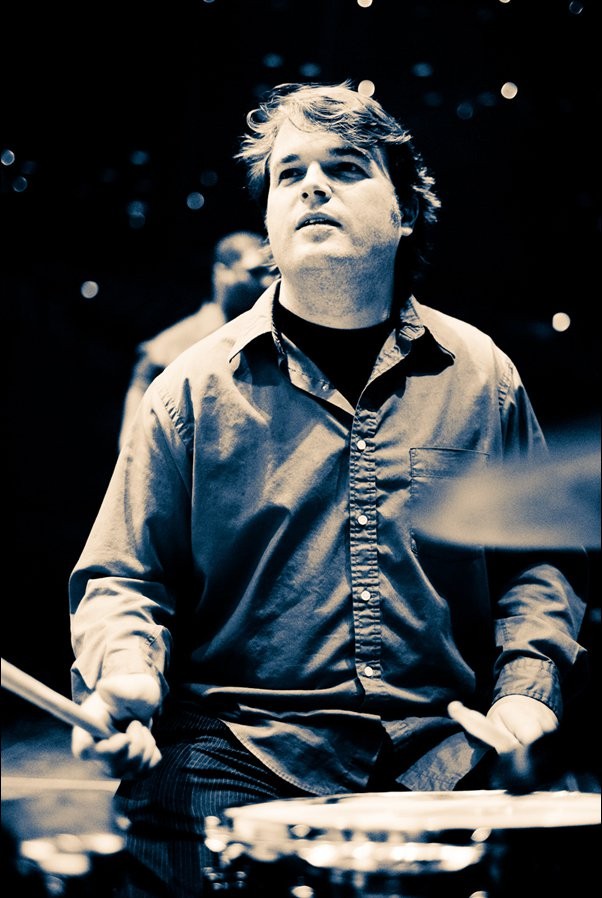 |
| Kevin Leahy |
|
|
As it turns out, it was a blessing that I didn’t get that gig. I continued to hunt down work in Atlanta and I was able to do a couple more shows with Shawn. In April of ’98, Shawn got a last minute call from the Indigo Girls to fill in the opening spot for some shows they were doing in the northeast. They heard the new record and wanted him to bring a band. We packed up a van and drove straight from Atlanta to New Hampshire for the first show. Between these shows and some airplay the new record was getting in Atlanta, some buzz started to grow, which eventually led to Shawn signing to Columbia Records. By the end of that year, Shawn had a #1 Top 40 hit with “Lullaby (Rock-a-bye)” and we found ourselves performing on TV shows like the Tonight Show and on the road opening up for artists like Chris Isaak and Hootie & the Blowfish. We continued to tour throughout the US and Europe well into the following year. Then, I spent a year or so playing with whoever I could. When I heard from Kenny about the opening with the BoDeans in early 2001, I was hungry again. In the fall of 2002, Jennifer Nettles was touring in support of her record. She was on the same circuit as Billy Pilgrim and Shawn Mullins. I really liked what she was doing, so I spent the fall of 2002 playing in her band. Soon after that tour, she began collaborating with Kristian Bush (formerly of Billy Pilgrim) and Kristin Hall, which led to the formation of Sugarland. In the spring of 2004, around the time they were signing a deal with Mercury Nashville, they were in need of a drummer for some showcases. I was scheduled to start the BoDeans tour in the summer to support the “Resolution” CD, so I was able to play with Sugarland for a handful of shows. I recently played with the Zac Brown Band “Breaking Southern Ground” tour, playing drums with the opening acts (Sonia Leigh and Nic Cowan). Zac won a Grammy for Best New Artist and we played shows throughout the US. Zac set the show up like an old-time, late-night barn jamboree picking session with different players coming on and off stage throughout the show. By the end of the night all 12 musicians were jamming on the stage – with both me and Zac’s drummer Chris Fryar playing drums. It really showed off the diversity and talent of the players involved. The concert can be seen on Zac Brown and Friends DVD 'Pass the Jar' released on Atlantic Records in 2010. MS: YouTube has an excerpt from Summerfest in 2003 with the BoDeans at Marcus Amphitheatre where Kenny joins you on stage. KL: The BoDeans shows at Summerfest in Milwaukee are a tradition. Kenny was playing with Michelle Branch nearby. We set up a few extra drums on the stage and had him join in. I’m glad it was caught on camera – it was pretty wild doing that in front of 25,000 people!
|
NIK ARONOFF Naturally, from birth I was exposed to music. I would see and hear my dad practicing in his old soundproof studio which left a massive subliminal imprint on me. Often he was in Bloomington making records with John. He would bring me in to the Belmont studio to hang out and play while everyone recorded or rehearsed for tours. So, looking back it is really amazing that I was there listening to them make records like Lonesome Jubilee.
I was exposed to all kinds of instruments and song writing from as early as I can remember. As I grew older I became passionate about it and I picked up the violin...but it was more for a girl than the music and it became boring to me. A few years later I got into the bass guitar because naturally, I wanted to kick ass in a rock band. Since I was becoming an avid bass player, playing guitar started to become a fun hobby. I was constantly trying to recreate the sounds with an effects processor and pedals to mirror nine inch nails and the Deftones. At this point I had the realization that the only way to express how much I loved my favorite music, to vent out my love and inspiration, was to create my own. I started purchasing recording equipment and messing around with sounds and songs. So I was 14 at this point. I then realized that I couldn't find anyone to write and play the things that I wanted so I had to play everything, including the drums. And this is where it started for me.
|
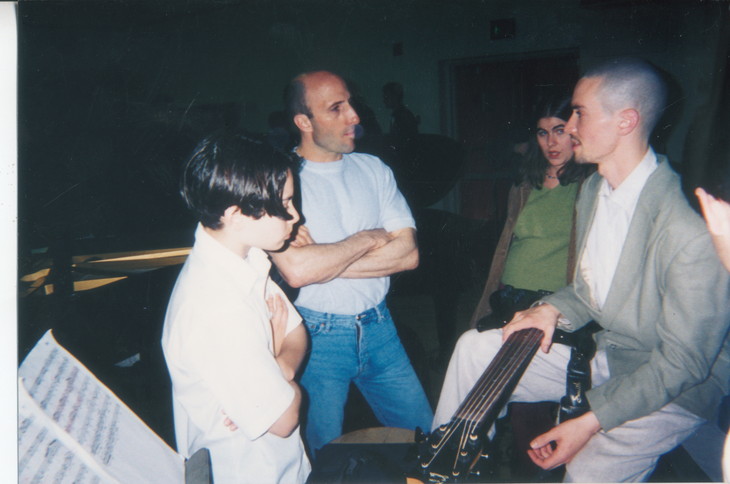 |
| Nik and Kenny Aronoff at IU when Nik preferred the Bass Guitar '98 |
|
|
I tried playing when I was younger but didn't have the patience to learn. But now I had all of this Aronoff energy and wanted to make music. So my dad gave me one lesson and I never stopped playing. In fact I stopped playing everything but the drums because it all became so boring to me. It kicked ass, and I felt like I was really doing something with myself. It stimulated me mentally and physically.
I continued learning on my own and memorizing albums front to back. Even though my dad never taught me more than one lesson on the kit, he had a lot of good advice and warm up ideas which I also do before a show. My style and my father’s are very similar but very different. We both have a lot of energy and love to rock. My foundational tools are hearing and memorization. He is very traditional and has a prestigious old school education of sight reading and counting and chart composing. I make fun of him and tell him his sight reading is infinitely better than his ability to read English. We differ in our approach to playing and in some music we listen to. I still get off on high energy prog rock bands and their drummers like the Mars Volta's Jon Theodore and Thomas Pridgen. My dad is very versatile, and can play so many styles. A lot of people freak out when he starts playing jazz or Afro-Cuban stuff or marimba or tympani. He is a bad ass at that stuff. Of course he plays it with more ferocity than anyone I have seen, but that is his legendary touch. He draws inspiration from a challenge and a never ending competition with himself every moment of the day. I get turned on by a guitar riff or a wicked part I have to play on the drums. Hearing him all of those years play like a steady locomotive, with the kick on one and snare on two, really instilled a solid rock n' roll foundation in me. He exposed me to it and gave me all of the tools. I just learned how to build the car by looking at other models. It was all thanks to him.
|
 |
| Nik Aronoff at the kit |
|
|
Kenny on Nik When I went to see Nik play at a club in Bloomington Indiana called ‘The Bluebird,’ I was really excited because that was the first club I ever played at when I moved to Bloomington. It was now his turn to kick ass as an Aronoff. (laughs) It brought back so many memories. I loved seeing him on that stage…I really loved his playing…that was the first time I ever saw him play in a band where he was really kicking ass and doing what a drummer should do in a band; play the right beat, keep time, groove, and be creative and musical with that foundation. His backbeat was in the same place every time and I told him ‘That’s where it’s at man, no matter what you do in between as long as that backbeat’s in the same place every time, that’s what people are listening for…the consistency, you did a great job!’ and Nik said, ‘I got used to hearing it that way all the time.’
|
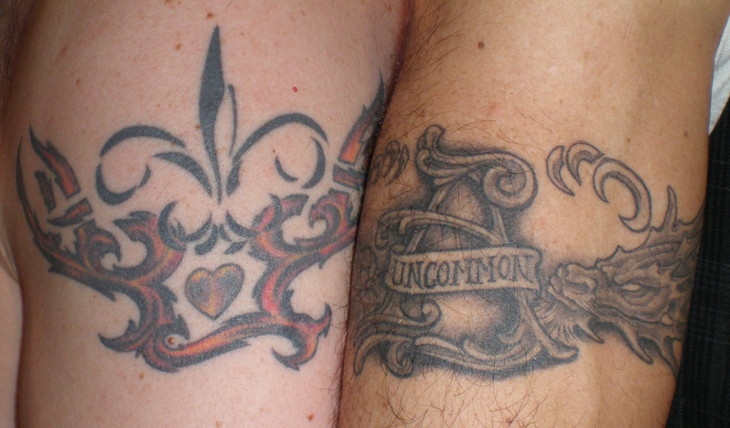 |
| My Trackmaster Tattoo with Kenny's Corey Miller Design |
|
|
Tattoo, Three, Four
I had the Fleur de Lis, then added the flame graphic borrowing the outline from Kenny's Trackmaster snare drum. There was a little framed gap at the bottom so I added the heart suggested by my artist (Trevor Collis). It reminds me to be myself, live with passion and do the work necessary to reach my goals, all lessons I learned from Kenny.
Then Kenny went out and got a cooler Trackmaster tattoo designed by Corey Miller...Bastard!!!
|
|
|